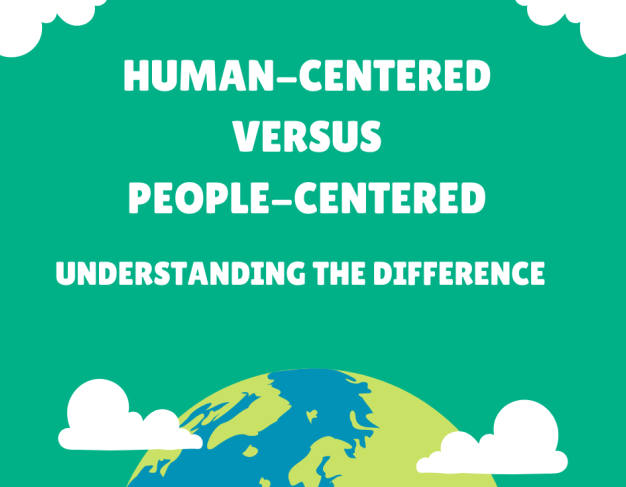Human-Centered versus People-Centered: Understanding the Difference, because words do matter
Macroeconomics is a branch of economics that studies how an overall economy—the markets, businesses, consumers, and governments—behaves. The focus is on metrics on output, not on the individuals who carry out the tasks to make these sectors work. On the other hand, human rights connect us through a shared set of rights and responsibilities. Every person has value and dignity.
In entrepreneurship and policymaking, two approaches are often used to address the needs of individuals and communities: human-centered and people-centered. While they share a common goal of improving the well-being of people, there are significant differences between the two approaches.
People-centered approaches tend to prioritize the needs and concerns of specific groups or communities, while human-centered approaches prioritize all individuals’ fundamental needs and values. While both approaches have benefits and drawbacks, it is essential to understand the distinctions to determine which method is appropriate for a given situation.
For example, consider the case of small businesses. A people-centered approach to small business policy might focus on the specific needs of small business owners and their communities, such as access to capital, tax incentives, and workforce development programs. While this approach can effectively address the concerns of small business owners and their communities, there may be more effective ways to ensure the long-term sustainability and growth of small businesses.
On the other hand, a human-centered approach to small business policy would prioritize the fundamental needs and values of all individuals involved in the small business ecosystem. This might include fair labor practices, environmental sustainability, and equitable access to resources and opportunities. A human-centered approach to small business policy can create a more sustainable and reasonable ecosystem for small businesses by prioritizing these fundamental needs and values.
It is important to note that a human-centered approach does not oppose the interests of specific groups or communities. Instead, it seeks to ensure that their interests are aligned with the interests of all humans and the greater good. By focusing on the well-being of all individuals involved in a particular ecosystem, a human-centered approach can create a more just and equitable society for everyone.
To achieve a more sustainable and equitable future for small businesses, it is crucial to adopt a human-centered approach that prioritizes the well-being of all individuals, regardless of their background or affiliation. As the world moves towards achieving the United Nations’ Sustainable Development Goals (SDGs), we must shift our focus towards implementing people- and human-centered policies.
At the International Council for Small Business (ICSB), our focus on human-centered policies for MSMEs aligns with the UN SDGs and our commitment to sustainability. By prioritizing the needs and well-being of individual entrepreneurs and their communities, we can create a more prosperous and equitable future for all. Through our research, programs, and networking efforts, we aim to promote policies and strategies that prioritize the human element of small business ecosystems, ultimately leading to a more sustainable and equitable future for all.
For ICSB, being Human Centered is synonymous with promoting Humane Entrepreneurship. Humane Entrepreneurship is an approach to entrepreneurship that prioritizes the well-being of individual entrepreneurs and their communities. It seeks to create sustainable and equitable ecosystems that are profitable and socially responsible. Humane Entrepreneurship creates an environment where businesses can thrive, and communities can prosper by prioritizing the fundamental needs and values of all individuals involved in a particular ecosystem. ICSB believes that a human-centered approach to entrepreneurship, grounded in the principles of Humane Entrepreneurship, is essential to creating a more just and equitable society for everyone.
Ultimately, a human-centered approach is not only essential for sustainable development and social progress, but it is also a moral imperative. We must create a world that prioritizes all individuals’ well-being and fundamental needs, regardless of their background or affiliation. So let us work together to create a more just and equitable world where all conditions are met, and everyone has the opportunity to thrive.
Written by:
Dr. Ayman ElTarabishy
President & CEO, ICSB
Deputy Chair, Department of Management
GW School of Business
The post Human-Centered versus People-Centered appeared first on ICSB | International Council for Small Business.



